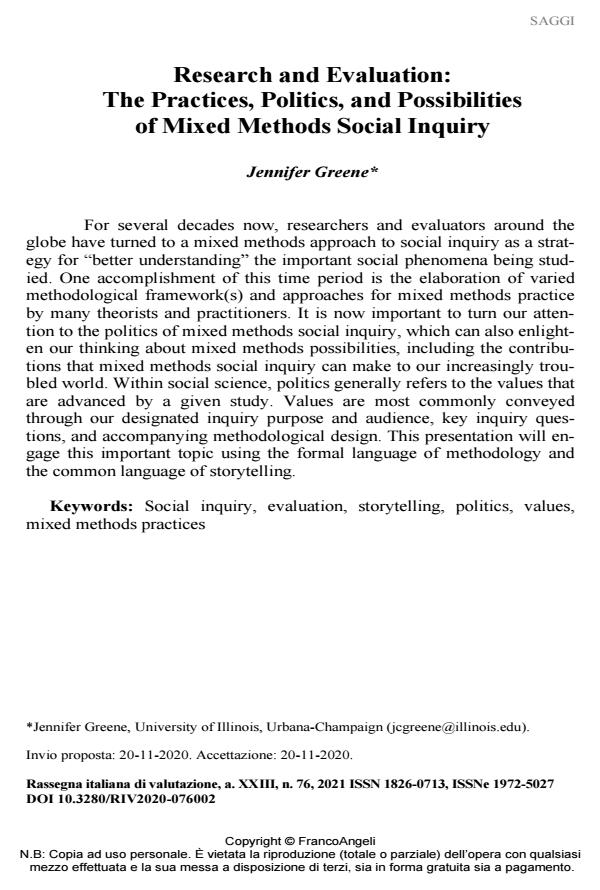Research and Evaluation: The Practices, Politics, and Possibilities of Mixed Methods Social Inquiry
Journal title RIV Rassegna Italiana di Valutazione
Author/s Jennifer Greene
Publishing Year 2021 Issue 2020/76 Language English
Pages 14 P. 19-32 File size 275 KB
DOI 10.3280/RIV2020-076002
DOI is like a bar code for intellectual property: to have more infomation
click here
Below, you can see the article first page
If you want to buy this article in PDF format, you can do it, following the instructions to buy download credits

FrancoAngeli is member of Publishers International Linking Association, Inc (PILA), a not-for-profit association which run the CrossRef service enabling links to and from online scholarly content.
For several decades now, researchers and evaluators around the globe have turned to a mixed methods approach to social inquiry as a strategy for "better understanding" the important social phenomena be-ing studied. One accomplishment of this time period is the elaboration of varied methodological framework(s) and approaches for mixed methods practice by many theorists and practitioners. It is now im-portant to turn our attention to the politics of mixed methods social in-quiry, which can also enlighten our thinking about mixed methods pos-sibilities, including the contributions that mixed methods social inquiry can make to our increasingly troubled world. Within social science, politics generally refers to the values that are advanced by a given study. Values are most commonly conveyed through our designated inquiry purpose and audience, key inquiry questions, and accompany-ing methodological design. This presentation will engage this important topic using the formal language of methodology and the common lan-guage of storytelling.
Keywords: Social inquiry, evaluation, storytelling, politics, values, mixed methods practices
- Bazeley P. (2018), Integrating analyses in mixed methods research. Los Angeles, CA: Sage.
- Greene J.C., Caracelli V.J., & Graham W.F. (1989), Toward a conceptual framework for mixed-method evaluation designs. Educational Evaluation and Policy Analysis, 11, 255-274.
- Moss P.A., Phillips D.C., Erickson F.D., Floden R.E., Lather P.A, and Schneider B.L. (2009), Educational Researcher, 38(6), 501-517.
- Sandelowski M., Voils C.I., and Knafl G. (2009), On quantitizing, Journal of Mixed Methods Research, 3(3), 208-222.
- Ungar M., and Liebenberg L. (2011), Assessing resilience across cultures using mixed methods: Construction of the Child and Youth Resilience Measure. Journal of Mixed Methods Research, 5(2), 126-149.
- Ungar M. (2008), Resilience across cultures. British Journal of Social Work, 38(2), 218-235.
- This paper was originally presented at a Roundtable Conference, on January 21,2020, hosted by the Department of Sociology and Social Research, at the University of Milano-Bicocca.
- Mixed Methods e valutazione democratica Nicoletta Stame, in RIV Rassegna Italiana di Valutazione 76/2021 pp.53
DOI: 10.3280/RIV2020-076004
Jennifer Greene, Research and Evaluation: The Practices, Politics, and Possibilities of Mixed Methods Social Inquiry in "RIV Rassegna Italiana di Valutazione" 76/2020, pp 19-32, DOI: 10.3280/RIV2020-076002